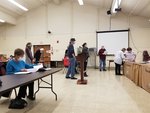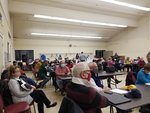MAMAKATING — The Mamakating Town Board held a public hearing on a Local Law regarding the Regulation of Short-Term Rentals during November 17th's town board meeting.
Many residents attended …
This item is available in full to subscribers.
Please log in to continue |


MAMAKATING — The Mamakating Town Board held a public hearing on a Local Law regarding the Regulation of Short-Term Rentals during November 17th's town board meeting.
Many residents attended the meeting causing COVID-19 regulations to be enforced to avoid more than 49 people inside town hall at one time.
Residents were asked to leave the room once they made their public comment to allow for others to be allowed to enter and have their say.
Town Supervisor Janet Lybolt started the public hearing by explaining the board's reasoning for creating this law. She said that many residents asked for regulation of short-term rentals, short term campgrounds, and Airbnbs because the problem has become a “quality of life” issue for many year-round residents in Mamakating.
Lybolt said the law was created after consulting surrounding townships' laws on short-term rentals. Lybolt said that she understands that property owners want to rent out their properties, but it is “the town's responsibility to ensure safety” while keeping issues in mind such as traffic, noise complaints, sewage, water, parking, and property values.
Residents had three minutes to address the board, and comments ranged from praise of regulation to critiquing the law for its financial impact.
What the law states
A copy of the law is available on Mamakating's website, but the biggest concern for residents involved regulation on the number of rental permits available and when those permits could be used.
The law states that “Hosted Short-Term Dwelling Rentals may be rented for a total of four calendar months within the calendar year. The property owner must select which four months within this time frame that rentals will occur, and each month of rental must be listed on the Short-Term Rental Certificate.”
The local law further states, “No more than 120 Short-Term Rental certificates may be in effect at any time and no more than 15 Short-Term Rental certificates may be in effect within any one zoning district at any time.”
Reactions
Fred Harding, a member of the Governance and Finance Committee for the Mamakating Local Development Corporation, pointed out that “tourism is the backbone of our economy” and people that stay more than one day spend more money than those who only stay for a day. He also stated that he was in favor of regulation, but cautioned the board: “don't overregulate.”
Kent Findlay, a member of the Zoning Board, asked why the four-month rule came to be when vacation campgrounds can run May 1 to October 31.
“Why not rent as much as you can?” he asked as he pointed out the town's comprehensive plan calls for ecotourism.
“People want unique, creative experiences,” and this law is taking that away from homeowners, he said.
Matthew Bremer, who owns a second home in Mamakating and rents his home using Airbnb said the four-month rule “could be financially devastating” for him as renting has allowed him to keep his second home.
He called Mamakating a “town for all seasons” and suggested the board revise the preselected four months to 120 calendar days per year to provide much more flexibility. Several other residents also spoke out against the four-month restriction citing similar comments.
Another resident, Alex Austin, who said without Airbnb he would have went bankrupt, stated that he lived on 65 acres where there are no neighbors to disturb, and the amount of permits available per zone is concerning.
“Who gets them?” Austin asked. Several residents asked the board to consider revising the permits to base the number on population density instead of zone.
Many residents spoke out in favor of the law due to safety concerns. Diane McDermott stated she lives in Mamakating all year on Yankee Lake, and she doesn't know who may be renting next to her from “a convict” to “a pedophile.”
She also told the board about renters in Yankee Lake who were loud, drunk or had to be saved from drowning in the lake. She alleged some had been walking on her property and stealing her firewood.
Elizabeth Zambuto, a member of the Yankee Lake Preservation Association, explained that because of Airbnbs, the Association is “at risk of being sued by guests” as liability insurance costs soar and the use of Yankee Lake is endangered because of safety and sewage/environmental concerns.
Sue Peavers told the board that due to the short-term campground next to her house, she has dealt with trespassers and stalkers and now has security cameras installed. She said that she has been living in Mamakating since 1997 and “I never felt like I had to do that [until now].”
Many members of the town sympathized with the trouble that some renters have caused, but many insisted that Airbnbs regulate themselves.
Bashakill Vineyards owner Samara Ferris told the board that Airbnbs are “an opportunity [for residents] to make extra money to make ends meet after the pandemic” and that they “are not just a free for all.”
Airbnb requires ID and address verification, according to Ferris.
Kelly Teacher, a resident who discovered Mamakating through staying at Airbnbs, stated that other than the Days Inn, there are no other motels in the town.
Other residents pointed out that Airbnb runs on a review system. If someone rates the rental with a bad review, that will lessen the chances of it being rented, so hosts try hard to make sure that rentals run smoothly.
It was also pointed out that regulation does not ensure that people will behave themselves. Amy Rein, who has an Airbnb in the Village of Wurtsboro, told the board that she has been doing rentals for ten years.
“The hope is not to allow people to terrorize the neighborhood,” Rein said. “We are already regulated…get to know who your hosts are.”
Public comment remains open
Supervisor Lybolt announced at the end of the hearing that the public hearing will be kept open for written and oral comments until and including the December 1st town board meeting.
The law was made available to the public one day before the hearing, and Supervisor Lybolt said she wanted to allow time for the public to address the board.
If anyone wants to make a comment, they can attend the December 1st meeting or submit written comment by contacting Town Hall.
Comments
No comments on this item Please log in to comment by clicking here